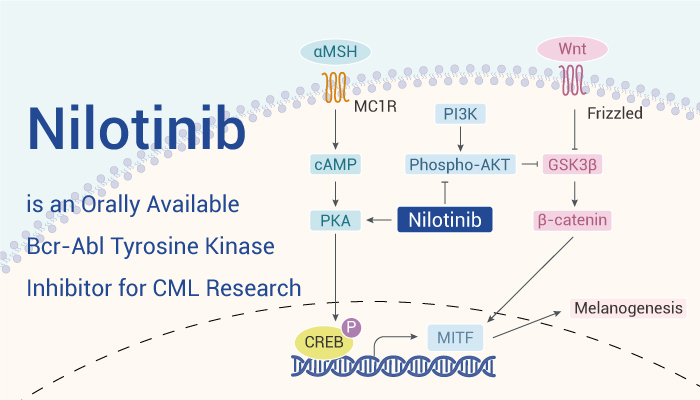BCR-ABL tyrosine kinase, an abnormal fusion protein kinase, is associated with pathogenesis of chronic myelogenous leukemia (CML) and Ph+ acute lymphoblastic leukemia (ALL). Usually, BCR-ABL is overexpressed with CML stem and progenitor cells. Nowadays, BCR-ABL inhibitors are widely used for treating CML, such as Imatinib. But the intolerable side effects or drug resistance of Imatinib are still problems. Thus, more potent therapeutic strategies are needed. Nilotinib is an orally active Bcr-Abl inhibitor, and is much more potent than Imatinib. Besides, Nilotinib also inhibits BCR-ABL point mutants with Imatinib resistance. In 2007, Nilotinib is first approved by FDA for therapy of CML, and overcomes Imatinib resistance and intolerance.

Nilotinib, a selective and orally active Bcr-Abl inhibitor, is an antitumor agent for CML.
In vitro, Nilotinib (0-30 nM, 3 days) dose-dependently inhibits proliferation of Imatinib-sensitive cell lines (K562 cells, 32D.p210 cells, and KU812 cells). Noticeably, Nilotinib (3 days) alone or with imatinib also effectively inhibits Imatinib-resistant cells (F317L-Ba/F3 cells, M351T-Ba/F3 cells, and F486S-Ba/F3 cells). In addition, Nilotinib (5 nM) in combination with Imatinib induces more apoptosis (2 days) and tyrosine phosphorylation (2 h) compared with drug alone.
In vivo, Nilotinib alone (15 mg/kg, p.o.) alone or in combination with Imatinib (50 mg/kg) inhibits tumor growth of mice 32D.p210 tumor model. Therefore, Nilotinib is potential for therapy of CML. Besides, Nilotinib (40 mg/kg, oral gavage, for 28 days.) also shows antitumor effect in gastrointestinal stromal tumors (GIST) xenograft model.
In conclusion, Nilotinib is a selective and orally active Bcr-Abl inhibitor, and is a potent antitumor agent for CML research.
References:
[1] Saglio G, et al. N Engl J Med. 2010 Jun 17;362(24):2251-9.
[2] Weisberg E, et al. Blood. 2007 Mar 1;109(5):2112-20.
[3] Sako H, et al. PLoS One. 2014 Sep 15;9(9):e107613.